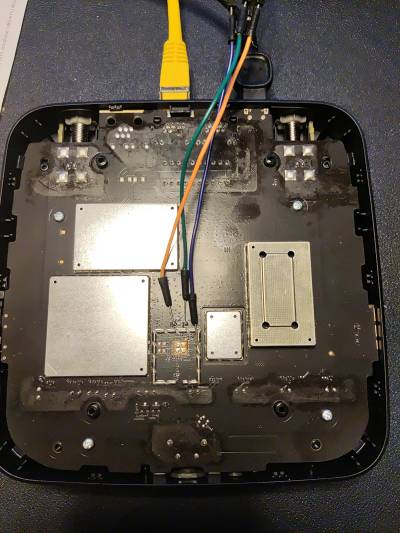This is an old revision of the document!
Linux/OpenWrt on the Alcatel HH40V
I needed a cheap LTE router for some quick tests and bought a used Alcatel HH40V for cheap. It's based on a QCA9531 SoC with 128MiB RAM and 16MiB flash and it's running an old, customized version of OpenWrt on this SoC. The LTE module is based on a Qualcomm module and is running its own, customized Android stack.
Getting access to the LTE module is documented here: https://github.com/froonix/HH40V/wiki
However, getting access to the SoC is neither documented nor easily possible - up to now.
Getting UART access
There are two pads for UART on the PCB - orange is Rx, green is Tx and blue is GND (that's not a pad):
The serial console is then available with 115200 baud and no password.
Getting SSH access
Getting SSH access is required in order to install OpenWrt without having to solder to the pads. I poked around in the filesystem and on the Wiki and found out that it is possible to download a configuration backup - unfortunately, it is encrypted. Someone in the Wiki mentioned it's based on OpenSSL, so I searched for OpenSSL in the file core_app, one of the biggest applications of the OEM firmware. It contained the hardcoded password for the for the backup file - yeah!
Long story short, with the information in this core_app, I could come up with a Python script that modifies the backup in a way that it enabled the Dropbear SSH server upon startup.
This is the script (also available at https://gist.github.com/andyboeh/d295c80a57d62379b926640762f3d5dd), run it as enable_sshd.py configure.bin. Then, upload the modified backup file (configure.bin_mod.bin) to your router, reboot and you have SSH access. Credentials: User “root”, Password “oelinux123”.
Once you have SSH access, you can proceed with installin OpenWrt.
